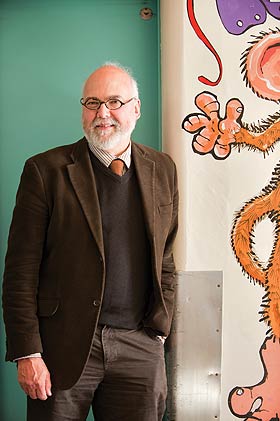

Professor Barry Taylor
“We know that overweight infants are more likely to become overweight children and end up as overweight adults.”
He may be one of New Zealand's most esteemed experts on childhood obesity, but Professor Barry Taylor has all but given up trying to enable overweight children to slim down.
As head of Paediatrics and Women's Health at the Dunedin School of Medicine and founder of Dunedin's Childhood Obesity Clinic, Taylor takes little comfort that his “notoriously unsuccessful” attempts to help kids lose weight echo the experiences of his colleagues all around the developed world.
“By the time the children reach us, it appears their trajectory has been set, possibly since infancy. We know that overweight infants are more likely to become overweight children and end up as overweight adults.”
Furthermore, he continues, “our preschoolers are getting fatter”. Taylor points to his group's earlier studies that suggest that up to 67 per cent of Otago's infants are growing faster than the World Health Organisation's recommended growth standards (based on “ideals” from studying healthy breast-fed babies of well-nourished, nonsmoking mothers from five continents).
This contributes to why we have some of the highest adult obesity rates in the world, behind the US and Mexico. In recent years, Taylor and his colleagues have been engaged in the FLAME project, a longitudinal study looking for “modifiable risk factors” related to activity and eating.
More and more, Taylor has become convinced that a far more useful approach is to prevent children from ever accumulating the kilos. And, as a researcher, he believes it's never too early in a person's life to look for clues as to what sets some of us on a path to perpetual weight battles, while others seem to remain effortlessly compact. The first signs, he suspects, “may even extend back to before we are born”.
Now, with 20 per cent of New Zealand children regarded as overweight, a further 10 per cent as obese and obesity predicted to become the greatest threat to health in the developed world – worse, even, than smoking – Taylor's approach is being treated with urgency. In 2009, he was awarded $2.3 million in Health Research Council funding for a three-year study into the prevention of rapid weight gain in early childhood.
The project will ultimately involve 800 mothers and babies, randomly assigned into four groups. The first is the control group, where participants will receive New Zealand's standard programme of well-child health care.
The second group receives extra support in areas aimed at promoting better eating habits and exercise patterns. This includes greater breastfeeding support, more advice on establishing healthy eating patterns as the babies wean, encouragement to limit children's television viewing and participation in a targeted activity programme from when babies are three months old – involving something like mini Swiss balls and baby skateboards – to stimulate brain circuits that determine motor skills.
The third group, meanwhile, will be encouraged to become better sleepers. Advice provided to parents will focus on “how to teach babies to fall asleep by themselves”. This means placing babies to sleep when they are still awake, maximising night-day differences and recommending babies sleep in their parents' bedroom for the first six months.
“After six months, where there is a sleep problem, we would suggest a technique called 'parental presence' and, if this does not fit the family, a technique called 'camping out' is encouraged.”
A fourth group receives support with feeding, activity and sleep. “They get everything!”
Such sleep strategies will go down well with some families, while others may resist them. But it is precisely that sleep can become such a highly-charged battleground in some circles that Taylor was keen to introduce it into this study.
“We know that children who sleep less are more likely to become overweight,” says Taylor, referring to the preliminary results from his group's FLAME study. “And we already know that parents who get better nights' sleep are happier.” But there is a shortage of an evidence base to fill the gaps to link sleep programmes to these better outcomes. Taylor's aim is to have a far better picture for parents and health funders to draw upon.
Indeed, Taylor's interest in childhood obesity is perhaps rivalled only by his interest in sleep. Over the past two decades, Taylor has led studies investigating the causes of Sudden Infant Death Sydrome, with recommendations for safe sleeping practices now the cornerstone for the advice provided to all new parents. He is now involved in a new study, exploring whether wahakura – low-sided, flax-woven bassinettes designed to be placed in the family bed – might provide a safer option for co-sleeping.
That the two subjects – sleeping and weight – intersect is not surprising to Taylor.
“So much of parenting centres on feeding and bedtime. And, when you become a parent, everyone is full of advice and anecdotes of what happened with their children. So we were interested in whether programmes to promote good sleeping resulted in children who do sleep better, maintain healthier weights and have parents less likely to report symptoms of depression.”
Currently in the recruitment stage, the study will measure the children's size and weight, sleeping and activity levels at six months, and one, two and three years of age.
Funding permitting, Taylor would also love to revisit the sample group when they turn seven. “That's when you really know if you've made a difference.”
Far better, believes Taylor, to meet them as healthy children whose infancy was supported by positive preventive medicine, than as overweight children he despairs of ever truly, meaningfully, helping.
Funding
- Heart Foundation
- University of Otago
- Dunedin School of Medicine
- National Child Health Research Foundation
- McKenzie Foundation
- Health Research Council
